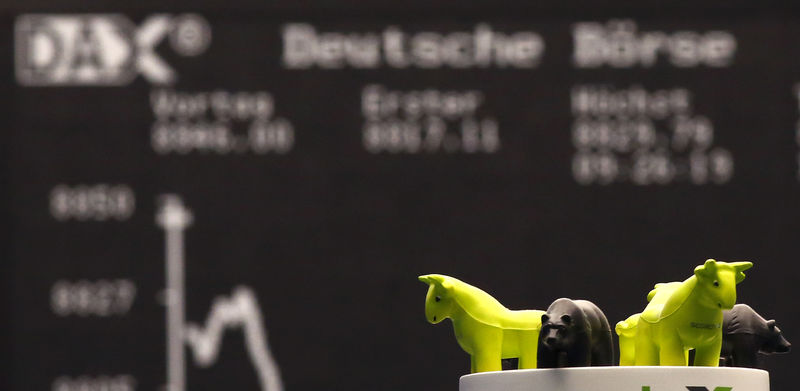By Peter Nurse
Investing.com - European stock markets are expected to open lower Tuesday as investors assess the interest rate outlook for 2023 in the wake of the Bank of Japan moving to end its super-easy monetary policy, the last in the developed world.
At 02:00 ET (07:00 GMT), the DAX futures contract in Germany traded 0.9% lower, CAC 40 futures in France dropped 0.6%, and the FTSE 100 futures contract in the U.K. fell 0.6%.
Asian equities slumped Tuesday, with the Nikkei 225 in Japan dropping 2.5%, and European stock indices are expected to follow suit after the Bank of Japan held its benchmark rate at record lows, but widened the range for yield fluctuations in the benchmark government bonds.
The central bank said it will raise the range of 10-year Japanese Government Bond yield fluctuations to between negative 0.5% and 0.5%, from a range of negative 0.25% to 0.25%.
This move has been taken as a step toward the country leaving behind its policy of yield curve control and near-zero interest rates as the country grapples with surging inflation.
The European Central Bank raised its interest rates by 50 basis points last week, in another step towards controlling inflation, as did the U.S. Federal Reserve, the Bank of England, and the Swiss National Bank.
German factory gate prices fell 3.9% on the month in November, but the annual figure still stood at a hefty 28.2%.
Elsewhere, European Union energy ministers on Monday agreed a gas price cap at €180 per megawatt hour, in the latest attempt to lower gas prices that have pushed energy bills higher and driven record-high inflation this year.
Oil prices edged higher Tuesday, continuing the recent pickup on demand optimism for the new year as China, the world’s largest importer of crude, fully reopens from its COVID restrictions.
Aiding the positive tone was the news that the U.S. government is aiming to refill its Strategic Petroleum Reserve, beginning with a 3 million barrel buy in February, having run it down to its lowest level in nearly 40 years in an attempt to curb prices.
The American Petroleum Institute releases its estimate of U.S. crude oil stocks later in the session, and is expected to show a small drop after the prior week’s hefty build.
By 02:00 ET, U.S. crude futures traded 0.5% higher at $75.78 a barrel, while the Brent contract rose 0.4% to $80.15. Both contracts closed higher in the prior session, marginally above the lowest levels this year.
Additionally, gold futures rose 0.3% to $1,802.30/oz, while EUR/USD traded 0.1% lower at 1.0598.
